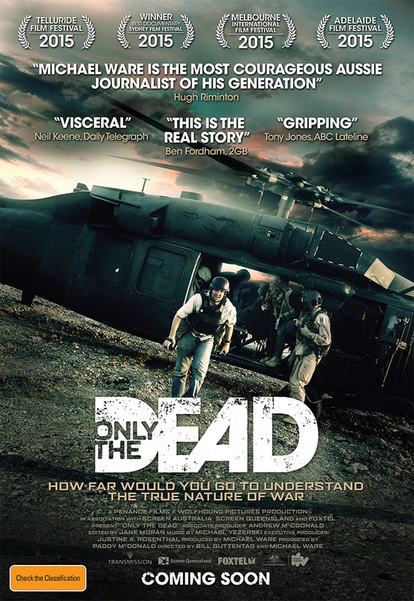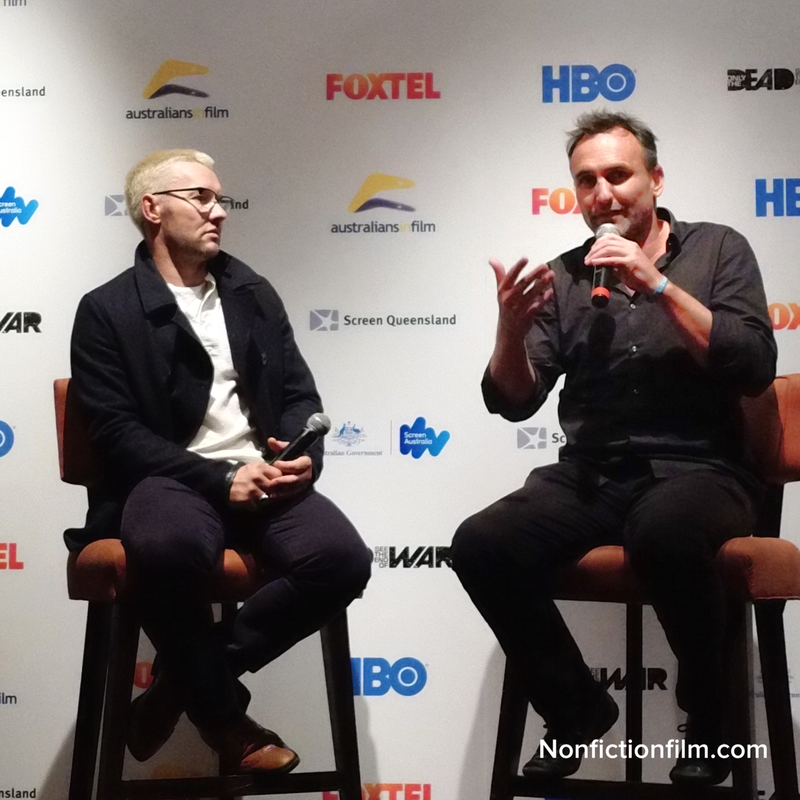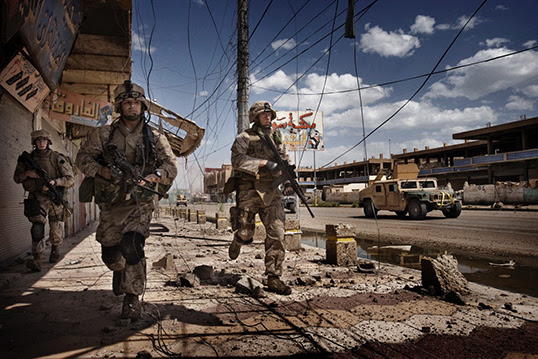|
Michael Ware covered the Iraq war for two major news outlets, but struggled to leave the conflict behind
When I worked with correspondent Michael Ware at CNN we knew him as fearless. Once or twice he may have been called a madman.
The Aussie journalist reported from Mexico at the height of the narco-violence, charging in where others feared to tread. He did likewise in Iraq during the bloodiest phases of the war, working first for Time magazine and later for CNN. Ware lived in Iraq and reported there for SEVEN years; for a soldier that would qualify as roughly five or six tours of duty. Nothing can ever replicate that hyper life, the brotherhood, the camaraderie, the clarity, the simplicity, the horror, the pain…
Anyone who believes a war correspondent's experience cannot be equated to a soldier's may think differently after seeing Ware’s new documentary Only the Dead (See the End of War), which he co-directed with Oscar-winning filmmaker Bill Guttentag.
The film is composed mostly of hand-held verité footage Ware shot while on the ground, and it’s brutal, heart-pounding stuff. Incinerated bodies, explosions, dead-of-night encounters with insurgents — supplemented by the occasional video, shot by insurgents, of a beheading.
The documentary opens December 4th in LA [Laemmle Pasadena Playhouse 7] and New York [Cinema Village]; it recently qualified for Oscar consideration, along with 123 other feature documentaries, and will eventually air on HBO. At a Q&A in LA moderated by his fellow Aussie, actor Joel Edgerton, Ware spoke of suffering PTSD after he left Iraq in 2009. He elaborated afterwards in a conversation with Nonfictionfilm.com. “There was a time where all I did was long to be back in Iraq and in the war. And it was hard to do, to stop hearing that call of the wild, but I have. I’ve made it back home,” Ware said. “And it may not be pretty, it may be bruised, it may be scarred but I finally found my peace with being back home.” As may be evident from that quote he is a fine, poetic writer, with something Hemingway-esque about him (both the swagger and the prose).
Ware provides a present-day narration to the footage he shot back then, in a voice-over that recalls Martin Sheen in Apocalypse Now. Example: “We all have dark places. I know I found mine — a place inside me I never knew I had.”
Like Kiwi journalist Peter Arnett, whose reporting from the first Gulf War triggered controversy, Ware’s reportage did not sit well with everyone. He became something of a go-to guy for insurgent Jihadis under the command of Abu Musab al-Zarqawi, the notorious figure who built the precursor to ISIS. Zarqawi’s fighters handed Ware exclusive videotapes of their operations, some of which showed them preparing attacks against American military personnel. Despite what some perceived as an overly-tight relationship with the insurgents, Ware shows a tendency (both in the film's voice-over and in his original footage) to use the pronoun “We” when describing US operations in Iraq. That he identified with US soldiers is curious — both because one would expect a journalist to observe greater objectivity, but also because he’s Australian, not American.
But part of what made Ware an effective reporter, undoubtedly, was his Zelig-like ability to get on an intimate footing with whomever he was covering. He has that effect on people — breaking down barriers, even in a war zone.
And it's clear the way he talks about war how little distinction he saw between himself and the troops on the ground. “There are certain things about the experience of the war — it’s like every old soldier’s story — nothing can ever replicate that hyper life, the brotherhood, the camaraderie, the clarity, the simplicity, the horror, the pain, nothing will ever match that in a certain kind of way,” Ware told Nonfictionfilm.com. “Every veteran has that story. The hardest part is marrying that with the rest of your life, with your new life. It’s trite to say it, but you’re never going to be the same person after that experience. The great challenge is, what do you make of that?” In Ware’s case, what he’s made is a film — one that’s compelling but that will divide critics. I found it especially useful as a primer on the roots of ISIS, but I think it would have been a more successful film had Ware bookended it with footage of his struggle to re-integrate into society following his long tour in Iraq. He accuses himself of moral failings – in one of the film's most heart-wrenching scenes he doesn't intervene when US troops refuse to render aid to a gravely wounded Iraqi fighter. We sense the psychic toll that took on Ware. But I think if he had added more recent footage revealing how he made peace with himself it would have made the film a more complete narrative experience.
|
AuthorMatthew Carey is a documentary filmmaker and journalist. His work has appeared on Deadline.com, CNN, CNN.com, TheWrap.com, NBCNews.com and in Documentary magazine. |
- Home
- News
- Videos
-
Galleries
- 2019 Tribeca Film Festival
- Full Frame Documentary Film Festival
- 2019 SXSW Film Festival
- SXSW 2018 Gallery
- 2019 Sundance Film Festival
- Outfest 2018 Photo Gallery
- Outfest 2017
- Sundance 2018 Photos
- 2017 LA Film Festival
- 2017 Cannes Film Festival
- Tribeca Film Festival 2017
- SXSW 2017 Gallery
- 2017 Berlin Film Festival
- Sundance 2017 Gallery
- 2016 Los Angeles Film Festival
- Cannes Film Festival 2016
- SXSW 2016 Gallery
- Berlinale 2016 Gallery
- Sundance 2016 Gallery
- Filmmaker Gallery
- About
- Contact
Proudly powered by Weebly
- Home
- News
- Videos
-
Galleries
- 2019 Tribeca Film Festival
- Full Frame Documentary Film Festival
- 2019 SXSW Film Festival
- SXSW 2018 Gallery
- 2019 Sundance Film Festival
- Outfest 2018 Photo Gallery
- Outfest 2017
- Sundance 2018 Photos
- 2017 LA Film Festival
- 2017 Cannes Film Festival
- Tribeca Film Festival 2017
- SXSW 2017 Gallery
- 2017 Berlin Film Festival
- Sundance 2017 Gallery
- 2016 Los Angeles Film Festival
- Cannes Film Festival 2016
- SXSW 2016 Gallery
- Berlinale 2016 Gallery
- Sundance 2016 Gallery
- Filmmaker Gallery
- About
- Contact




 RSS Feed
RSS Feed